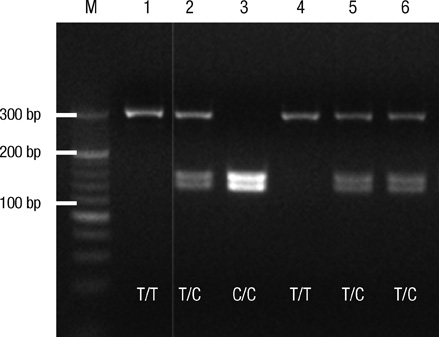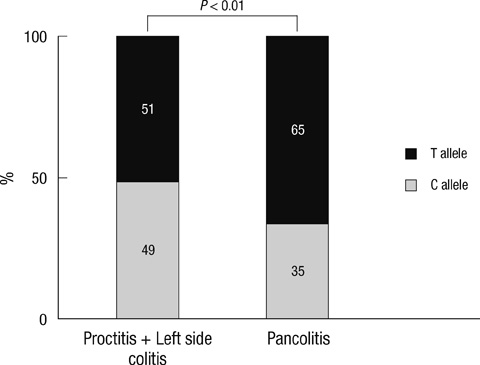J Korean Med Sci.
2012 Jan;27(1):72-77. 10.3346/jkms.2012.27.1.72.
Association Between Toll-Like Receptors/CD14 Gene Polymorphisms and Inflammatory Bowel Disease in Korean Population
- Affiliations
-
- 1Department of Internal Medicine, St. Vincent Hospital, The Catholic University of Korea, Suwon, Korea. drmaloman@catholic.ac.kr
- KMID: 1792982
- DOI: http://doi.org/10.3346/jkms.2012.27.1.72
Abstract
- The innate immune response in patients who develop inflammatory bowel disease (IBD) may be abnormal. However, the exact role of Toll-like receptors (TLRs) / CD14 gene in the pathogenesis of IBD has not been fully elucidated. We aimed to investigate the association between polymorphisms of TLR1, 2, 4, 6, and CD14 gene and susceptibility to IBD in Korean population. A total 144 patients of IBD (99 patients with ulcerative colitis, 45 patients with Crohn's disease) and 178 healthy controls were enrolled. Using a PCR-RFLP, we evaluated mutations of TLR1 (Arg80Thr), TLR2 (Arg753Gln and Arg677Trp), TLR4 (Asp299Gly and Thr399Ile), TLR6 (Ser249Pro) genes and the -159 C/T promoter polymorphism of CD14 gene. No TLR polymorphisms were detected in Korean subjects. T allele and TT genotype frequencies of CD14 gene were significantly higher in IBD patients than in healthy controls. In subgroup analysis, T allelic frequency was higher in pancolitis phenotype of ulcerative colitis. In Korean population, the promoter polymorphism at -159 C/T of the CD14 gene is positively associated with IBD, both ulcerative colitis and Crohn's disease.
MeSH Terms
-
Adult
Aged
Alleles
Antigens, CD14/*genetics
Asian Continental Ancestry Group/*genetics
Colitis, Ulcerative/genetics
Crohn Disease/genetics
Female
Gene Frequency
Genetic Predisposition to Disease
Genotype
Humans
Inflammatory Bowel Diseases/*genetics
Male
Middle Aged
Phenotype
Polymorphism, Single Nucleotide
Promoter Regions, Genetic
Republic of Korea
Toll-Like Receptor 1/genetics
Toll-Like Receptor 2/genetics
Toll-Like Receptor 4/genetics
Toll-Like Receptor 6/genetics
Toll-Like Receptors/*genetics
Figure
Reference
-
1. Perera FP, Weinstein IB. Molecular epidemiology: recent advances and future directions. Carcinogenesis. 2000. 21:517–524.2. Freeman HJ. Familial Crohn's disease in single or multiple first-degree relatives. J Clin Gastroenterol. 2002. 35:9–13.3. Ahmad T, Satsangi J, McGovern D, Bunce M, Jewell DP. The genetics of inflammatory bowel disease. Aliment Pharmacol Ther. 2001. 15:731–748.4. Hugot JP, Thomas G. Genome-wide scanning in inflammatory bowel disease. Dig Dis. 1998. 16:364–369.5. Aderem A, Ulevitch RJ. Toll-like receptors in the induction of the innate immune response. Nature. 2000. 406:782–787.6. Akira S, Sato S. Toll-like receptors and their signaling mechanisms. Scand J Infect Dis. 2003. 35:555–562.7. Antal-Szalmás P. Evaluation of CD14 in host defence. Eur J Clin Invest. 2000. 30:167–179.8. Lin J, Yao YM, Yu Y, Chai JK, Huang ZH, Dong N, Sheng ZY. Effects of CD14-159 C/T polymorphism on CD14 expression and the balance between proinflammatory and anti-inflammatory cytokines in whole blood culture. Shock. 2007. 28:148–153.9. Klein W, Tromm A, Griga T, Fricke H, Folwaczny C, Hocke M, Eitner K, Marx M, Duerig N, Epplen JT. A polymorphism in the CD14 gene is associated with Crohn disease. Scand J Gastroenterol. 2002. 37:189–191.10. Gazouli M, Mantzaris G, Kotsinas A, Zacharatos P, Papalambros E, Archimandritis A, Ikonomopoulos J, Gorgoulis VG. Association between polymorphisms in the Toll-like receptor 4, CD14, and CARD15/NOD2 and inflammatory bowel disease in the Greek population. World J Gastroenterol. 2005. 11:681–685.11. Leung E, Hong J, Fraser AG, Merriman TR, Vishnu P, Abbott WG, Krissansen GW. Polymorphisms of CARD15/NOD2 and CD14 genes in New Zealand Crohn's disease patients. Immunol Cell Biol. 2005. 83:498–503.12. Obana N, Takahashi S, Kinouchi Y, Negoro K, Takagi S, Hiwatashi N, Shimosegawa T. Ulcerative colitis is associated with a promoter polymorphism of lipopolysaccharide receptor gene, CD14. Scand J Gastroenterol. 2002. 37:699–704.13. Guo QS, Xia B, Jiang Y, Morré SA, Cheng L, Li J, Crusius JB, Peña AS. Polymorphisms of CD14 gene and TLR4 gene are not associated with ulcerative colitis in Chinese patients. Postgrad Med J. 2005. 81:526–529.14. Peters KE, O'Callaghan NJ, Cavanaugh JA. Lack of association of the CD14 promoter polymorphism: 159C/T with Caucasian inflammatory bowel disease. Scand J Gastroenterol. 2005. 40:194–197.15. Wang F, Tahara T, Arisawa T, Shibata T, Nakamura M, Fujita H, Iwata M, Kamiya Y, Nagasaka M, Takahama K, Watanabe M, Hirata I, Nakano H. Genetic polymorphisms of CD14 and Toll-like receptor-2 (TLR2) in patients with ulcerative colitis. J Gastroenterol Hepatol. 2007. 22:925–929.16. Yang SK, Hong WS, Min YI, Kim HY, Yoo JY, Rhee PL, Rhee JC, Chang DK, Song IS, Jung SA, Park EB, Yoo HM, Lee DK, Kim YK. Incidence and prevalence of ulcerative colitis in the Songpa-Kangdong district, Seoul, Korea, 1986-1997. J Gastroenterol Hepatol. 2000. 15:1037–1042.17. Gasche C, Scholmerich J, Brynskov J, D'Haens G, Hanauer SB, Irvine EJ, Jewell DP, Rachmilewitz D, Sachar DB, Sandborn WJ, Sutherland LR. A simple classification of Crohn's disease: report of the Working Party for the World Congresses of Gastroenterology, Vienna 1998. Inflamm Bowel Dis. 2000. 6:8–15.18. Caprilli R, Gassull MA, Escher JC, Moser G, Munkholm P, Forbes A, Hommes DW, Lochs H, Angelucci E, Cocco A, Vucelic B, Hildebrand H, Kolacek S, Riis L, Lukas M, de Franchis R, Hamilton M, Jantschek G, Michetti P, O'Morain C, Anwar MM, Freitas JL, Mouzas IA, Baert F, Mitchell R, Hawkey CJ. European Crohn's and Colitis Organisation. European evidence based consensus on the diagnosis and management of Crohn's disease: special situations. Gut. 2006. 55:i36–i58.19. Satsangi J, Silverberg MS, Vermeire S, Colombel JF. The Montreal classification of inflammatory bowel disease: controversies, consensus, and implications. Gut. 2006. 55:749–753.20. Stange EF, Travis SP, Vermeire S, Beglinger C, Kupcinkas L, Geboes K, Barakauskiene A, Villanacci V, Von Herbay A, Warren BF, Garche C, Tilg H, Schreiber SW, Schölmerich J, Reinisch W. European Crohn's and Colitis Organisation. European evidence based consensus on the diagnosis and management of Crohn's disease: definition and diagnosis. Gut. 2006. 55:i1–i15.21. Ohkusa T, Nomura T, Sato N. The role of bacterial infection in the pathogenesis of inflammatory bowel disease. Intern Med. 2004. 43:534–539.22. Rakoff-Nahoum S, Paglino J, Eslami-Varzaneh F, Edberg S, Medzhitov R. Recognition of commensal microflora by toll-like receptors is required for intestinal homeostasis. Cell. 2004. 118:229–241.23. Lee J, Mo JH, Katakura K, Alkalay I, Rucker AN, Liu YT, Lee HK, Shen C, Cojocaru G, Shenouda S, Kagnoff M, Eckmann L, Ben-Neriah Y, Raz E. Maintenance of colonic homeostasis by distinctive apical TLR9 signalling in intestinal epithelial cells. Nat Cell Biol. 2006. 8:1327–1336.24. Baumgart DC, Buning C, Geerdts L, Schmidt HH, Genschel J, Fiedler T, Gentz E, Molnar T, Nagy F, Lonovics J, Lochs H, Wiedenmann B, Nickel R, Witt H, Dignass A. The c.1-260C>T promoter variant of CD14 but not the c.896A>G (p.D299G) variant of toll-like receptor 4 (TLR4) genes is associated with inflammatory bowel disease. Digestion. 2007. 76:196–202.25. Franchimont D, Vermeire S, El Housni H, Pierik M, Van Steen K, Gustot T, Quertinmont E, Abramowicz M, Van Gossum A, Devière J, Rutgeerts P. Deficient host-bacteria interactions in inflammatory bowel disease? The toll-like receptor (TLR)-4 Asp299gly polymorphism is associated with Crohn's disease and ulcerative colitis. Gut. 2004. 53:987–992.26. Pierik M, Joossens S, Van Steen K, Van Schuerbeek N, Vlietinck R, Rutgeerts P, Vermeire S. Toll-like receptor-1,-2,and-6 polymorphisms influence disease extension in inflammatory bowel diseases. Inflamm Bowel Dis. 2006. 12:1–8.27. Hubacek JA, Rothe G, Pit'ha J, Skodová Z, Stanëk V, Poledne R, Schmitz G. C(-260)→T polymorphism in the promoter of the CD14 monocyte receptor gene as a risk factor for myocardial infarction. Circulation. 1999. 99:3218–3220.28. Schütt C. Fighting infection: the role of lipopolysaccharide binding proteins CD14 and LBP. Pathobiology. 1999. 67:227–229.
- Full Text Links
- Actions
-
Cited
- CITED
-
- Close
- Share
- Similar articles
-
- Do Toll-like Receptors Play a New Role as a Biomarker of Irritable Bowel Syndrome?
- Lipopolysaccharide: Basic Biochemistry, Intracellular Signaling, and Physiological Impacts in the Gut
- The Gate Way of Communication between Microorganism and Human Body: Toll-like Receptors
- Toll-Like Receptor 10-1-6 Gene Cluster Polymorphisms Are Not Associated With Benign Prostatic Hyperplasia in Korean Population
- The role of CD14 and Toll-like receptors on the release of MMP-8 in the LPS recognition pathway



